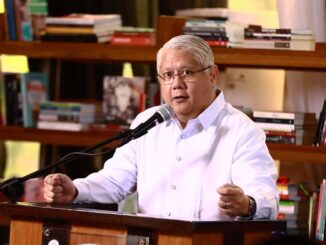
THE Philippines stressed that its claim to its extended continental shelf (ECS) in the Western Palawan Region is consistent with its maritime entitlements under the United Nations Convention on the Law of the Sea (Unclos).
This was “demonstrated by our ECS submission made on June 15, 2024,” the Department of Foreign Affairs (DFA) said, as Vietnam also sought an ECS in the South China Sea (SCS).
The DFA, in a statement on Thursday, said it took note of the submission made by Vietnam to the UN Commission on the Limits of the Continental Shelf (UNCLCS) on July 17 regarding its claim to an ECS in the SCS.
Department of Foreign Affairs
“Nevertheless, we acknowledge Vietnam’s right, as a coastal State like the Philippines, to submit information to establish the outer limits of their continental shelf beyond 200 nautical miles from the relevant and lawful baselines from which its territorial sea is measured, as provided for under Unclos,” it said.
“We are ready to engage Vietnam on possible ways forward that would help achieve a mutually beneficial solution to South China Sea issues, in accordance with international law, particularly Unclos,” it added.
The Philippines on June 15, through the Philippine Mission to the UN in New York, submitted information to the UNCLCS to register the country’s entitlement to an ECS in the West Palawan Region in the West Philippine Sea/South China Sea.
The Philippine Permanent Representative to UN in New York, Ambassador Antonio Lagdameo, said that this submission “can reinvigorate efforts of States to demonstrate their readiness to pursue Unclos processes in the determination of maritime entitlements and promote a rules-based international order.”
This was the second time the Philippines has made a submission on an ECS entitlement, the DFA said.
In April 2009, the Philippines made a partial submission on the Philippine Rise, which the CLCS validated in 2012, resulting in an additional 135,506 square kilometers of seabed area for the Philippines.

Southern Tagalog militants rally in front of the US Embassy in Manila on July 18, 2024, part of a week-long Lagablab Protest Caravan highlighting issues on sovereignty, attacks on workers’ unions, and human rights violations in their region. PHOTOS BY MIKE ALQUINTO

Southern Tagalog militants rally in front of the US Embassy in Manila on July 18, 2024, part of a week-long Lagablab Protest Caravan highlighting issues on sovereignty, attacks on workers’ unions, and human rights violations in their region. PHOTOS BY MIKE ALQUINTO

Southern Tagalog militants rally in front of the US Embassy in Manila on July 18, 2024, part of a week-long Lagablab Protest Caravan highlighting issues on sovereignty, attacks on workers’ unions, and human rights violations in their region. PHOTOS BY MIKE ALQUINTO

Southern Tagalog militants rally in front of the US Embassy in Manila on July 18, 2024, part of a week-long Lagablab Protest Caravan highlighting issues on sovereignty, attacks on workers’ unions, and human rights violations in their region. PHOTOS BY MIKE ALQUINTO

Southern Tagalog militants rally in front of the US Embassy in Manila on July 18, 2024, part of a week-long Lagablab Protest Caravan highlighting issues on sovereignty, attacks on workers’ unions, and human rights violations in their region. PHOTOS BY MIKE ALQUINTO

Southern Tagalog militants rally in front of the US Embassy in Manila on July 18, 2024, part of a week-long Lagablab Protest Caravan highlighting issues on sovereignty, attacks on workers’ unions, and human rights violations in their region. PHOTOS BY MIKE ALQUINTO

Southern Tagalog militants rally in front of the US Embassy in Manila on July 18, 2024, part of a week-long Lagablab Protest Caravan highlighting issues on sovereignty, attacks on workers’ unions, and human rights violations in their region. PHOTOS BY MIKE ALQUINTO

Southern Tagalog militants rally in front of the US Embassy in Manila on July 18, 2024, part of a week-long Lagablab Protest Caravan highlighting issues on sovereignty, attacks on workers’ unions, and human rights violations in their region. PHOTOS BY MIKE ALQUINTO

Southern Tagalog militants rally in front of the US Embassy in Manila on July 18, 2024, part of a week-long Lagablab Protest Caravan highlighting issues on sovereignty, attacks on workers’ unions, and human rights violations in their region. PHOTOS BY MIKE ALQUINTO

Southern Tagalog militants rally in front of the US Embassy in Manila on July 18, 2024, part of a week-long Lagablab Protest Caravan highlighting issues on sovereignty, attacks on workers’ unions, and human rights violations in their region. PHOTOS BY MIKE ALQUINTO
In that submission, the Philippines stated that it reserved the right to make submissions in other areas in the future.
DFA Assistant Secretary for Maritime and Ocean Affairs Marshall Louis Alferez said that the submission was a declaration not only of the Philippines’ maritime entitlements under Unclos but also of the country’s commitment to the responsible application of its processes.
He noted that the 2016 Award on the South China Sea Arbitration confirmed the Philippines’ maritime entitlements and rejected those that exceeded geographic and substantive limits under Unclos.

Retired Supreme Court Associate Justice Antonio Carpio and Philippine Coast Guard Commodore Jay Tarriela, spokesman on the West Philippine Sea, answer media questions on the arbitral ruling, eight years after, at the weekly ‘Kapihan sa Manila Bay,’ on July 17, 2024. PHOTO BY MIKE ALQUINTO

Retired Supreme Court Associate Justice Antonio Carpio and Philippine Coast Guard Commodore Jay Tarriela, spokesman on the West Philippine Sea, answer media questions on the arbitral ruling, eight years after, at the weekly ‘Kapihan sa Manila Bay,’ on July 17, 2024. PHOTO BY MIKE ALQUINTO

Retired Supreme Court Associate Justice Antonio Carpio and Philippine Coast Guard Commodore Jay Tarriela, spokesman on the West Philippine Sea, answer media questions on the arbitral ruling, eight years after, at the weekly ‘Kapihan sa Manila Bay,’ on July 17, 2024. PHOTO BY MIKE ALQUINTO

Retired Supreme Court Associate Justice Antonio Carpio and Philippine Coast Guard Commodore Jay Tarriela, spokesman on the West Philippine Sea, answer media questions on the arbitral ruling, eight years after, at the weekly ‘Kapihan sa Manila Bay,’ on July 17, 2024. PHOTO BY MIKE ALQUINTO

Retired Supreme Court Associate Justice Antonio Carpio and Philippine Coast Guard Commodore Jay Tarriela, spokesman on the West Philippine Sea, answer media questions on the arbitral ruling, eight years after, at the weekly ‘Kapihan sa Manila Bay,’ on July 17, 2024. PHOTO BY MIKE ALQUINTO

Retired Supreme Court Associate Justice Antonio Carpio and Philippine Coast Guard Commodore Jay Tarriela, spokesman on the West Philippine Sea, answer media questions on the arbitral ruling, eight years after, at the weekly ‘Kapihan sa Manila Bay,’ on July 17, 2024. PHOTO BY MIKE ALQUINTO

Retired Supreme Court Associate Justice Antonio Carpio and Philippine Coast Guard Commodore Jay Tarriela, spokesman on the West Philippine Sea, answer media questions on the arbitral ruling, eight years after, at the weekly ‘Kapihan sa Manila Bay,’ on July 17, 2024. PHOTO BY MIKE ALQUINTO

Retired Supreme Court Associate Justice Antonio Carpio and Philippine Coast Guard Commodore Jay Tarriela, spokesman on the West Philippine Sea, answer media questions on the arbitral ruling, eight years after, at the weekly ‘Kapihan sa Manila Bay,’ on July 17, 2024. PHOTO BY MIKE ALQUINTO

Retired Supreme Court Associate Justice Antonio Carpio and Philippine Coast Guard Commodore Jay Tarriela, spokesman on the West Philippine Sea, answer media questions on the arbitral ruling, eight years after, at the weekly ‘Kapihan sa Manila Bay,’ on July 17, 2024. PHOTO BY MIKE ALQUINTO

Retired Supreme Court Associate Justice Antonio Carpio and Philippine Coast Guard Commodore Jay Tarriela, spokesman on the West Philippine Sea, answer media questions on the arbitral ruling, eight years after, at the weekly ‘Kapihan sa Manila Bay,’ on July 17, 2024. PHOTO BY MIKE ALQUINTO

Retired Supreme Court Associate Justice Antonio Carpio and Philippine Coast Guard Commodore Jay Tarriela, spokesman on the West Philippine Sea, answer media questions on the arbitral ruling, eight years after, at the weekly ‘Kapihan sa Manila Bay,’ on July 17, 2024. PHOTO BY MIKE ALQUINTO
“Incidents in the waters tend to overshadow the importance of what lies beneath,” Alferez said in a statement.
“The seabed and the subsoil extending from our archipelago up the maximum extent allowed by Unclos hold significant potential resources that will benefit our nation and our people for generations to come,” he said.
Alferez added, “Today we secure our future by making a manifestation of our exclusive right to explore and exploit natural resources in our ECS entitlement.”
He also said that the Philippine submission does not prejudice discussions with relevant coastal States that may have legitimate ECS claims measured from their respective lawful baselines under Unclos.
“We consider our submission as a step in discussing delimitation matters and other forms of cooperation moving forward. What is important is the Philippines puts on record the maximum extent of our entitlement,” he said.









Be the first to comment